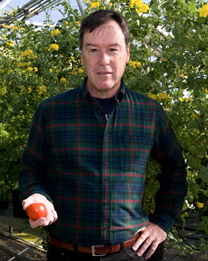Hageman Distinguished Lecturer in Agricultural Biochemistry
|
About the Speaker
The Hageman lecture series has existed for 20 years; Professor Harry J. Klee is the 21st lecturer. It is fitting that he spent several years of the early 1980s as a postdoctoral fellow with our first lecturer, Eugene Nester. Although Agrobacterium had been recognized for decades as an interesting bacterium inducing crown gall, it was only with their success in characterizing the Ti plasmid that a revolution in plant breeding was made possible.
Professor Klee is Eminent Scholar at the University of Florida, Gainesville since 1995 and holds the Paul Dickman Chair in Plant Improvement. He is author of more than 100 peer-reviewed publications and another 50 book chapters and invited commentaries and reviews. He has served on editorial boards of several plant related journals and was editor of The Plant Journal for 7 years. He has also been graduate coordinator and director of the interdisciplinary Plant Molecular and Cellular Biology program at the University of Florida. He is currently a visiting professor at Zhejiang University. He has served on many national review panels for USDA and NSF, and several international, external review boards. In addition to his election as a Fellow of AAAS (2009) and member of the National Academy of Sciences (2012), Professor Klee has been active in the American Society of Plant Biology, and served as president of that organization 2017-2018.
Harry J. Klee grew up a native of Massachusetts and obtained a B.S. in Psychology and PhD in Biochemistry from UMass, Amherst. Following his PhD work on tRNAs, and 4 years with Eugene Nester, he joined the newly formed research group headed by Rob Fraley at Monsanto. He was deeply involved in turning the Ti plasmid into a tool for plant transformation, ultimately leading to GMOs for Round-Up Ready crops including canola, cotton and soybean. Working with crown gall induced by the Ti plasmid naturally led to study of plant hormones beyond just auxin and cytokinins. Most plant signal systems affect an array of genes, some of which produce other signals in turn. Development of a mature fruit depends on precise coordination of vast networks of genes from flower formation to fruit harvest.
For the modern miracle of fresh produce the year round in non-tropical climates a major challenge is to keep the flavor in, yet let it out so we can taste (smell) it. During the past two decades Harry Klee has focused on this huge challenge, identifying the complexities of how flavor molecules are synthesized and released. His earlier work with the Never-ripe tomato, and interactions of ethylene, salicylic acid, strigolactones and abscisic acid during plant development laid the groundwork for this. For his work on ethylene he was honored to give the Shang Fa Yang lecture at Academica Sinica, Taipei, Taiwan, in 2014. The Hageman lecture will be a current status report on the biochemistry and molecular biology of flavor in the tomato, most widely consumed fruit in the U.S. The colloquium will ask how we can get people to eat their veggies.
 Dr. Harry Klee
Dr. Harry Klee